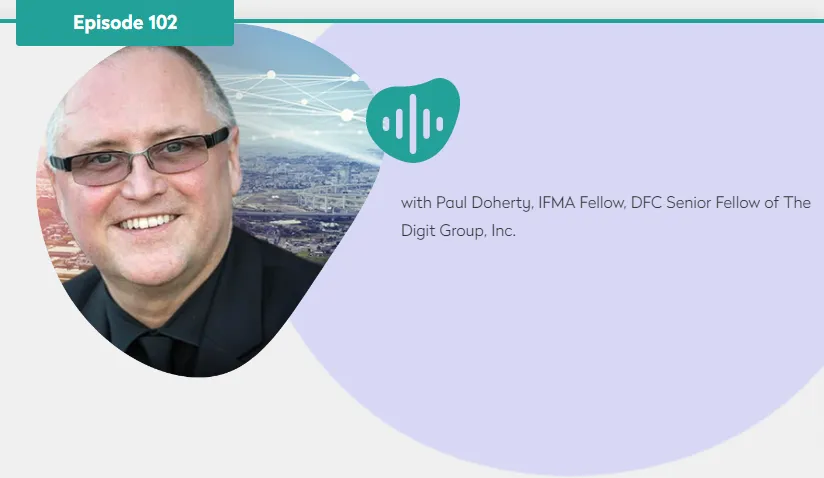
In episode 102 of Asset Champion, host Mike Petrusky speaks with Paul Doherty, IFMA Fellow and CEO of The Digit Group, Inc. (TDG), an American smart city real estate development and investment company. They discuss how Doherty found himself at some of the significant moments of the impact of technology with the built environment and then look at the opportunities created by new technologies such as artificial intelligence (AI) for better design, construction, and operations.
Agenda
- Paul Dougherty and his professional background
- Role of AI in asset management
- Impact of technology on the built environment
- Importance of sustainability in asset management
- Role of technology in the future of work
What you need to know: 3 Facility and maintenance takeaways
Takeaway 1: The importance of human-centric planning in built environments
People-centric planning relies on technologies to promote efficiency, accuracy, and decision-making in asset management, Dougherty explains.
“What is a solution?” he asks. “How about designing the space from where a person lives to where they work to where they have to shop to where they work out to then go home? Did you design it so that there’s 10,000 steps? If you did, now it becomes part of an overall way of thinking through an environment of well-being and that also includes in the workplace.”
Dougherty highlights the need to consider sustainability in its broadest sense, encompassing not just environmental factors, but also sustainable mental health and economics. “Sustainability is not just about the environment. It’s about sustainable mental health. It’s about sustainable economics. So that word sustainability is a big bucket to me. It’s not just one thing.”
Takeaway 2: The transformative impact of technology on asset management
Because of its ability to enhance efficiency and decision-making, AI will have a transformative impact on asset management. But the industry should approach technology thoughtfully, considering its potential to transform job roles, warns Dougherty.
“AI is not going to take your job, but a person using AI will. That’s the strongest way that I can say you can embrace the technology. But again, it doesn’t hug you back. So, this idea of improving the efficiency and accuracy of asset management processes and most importantly, decision-making will help everything become clearer, so that you can actually make proper decisions on sustainability, on risk management, on this idea of innovation.”
He continues: “I would not jump at everything that’s out there. But from your perspective and how you hear things from other people, it’s okay to pop popcorn every once in a while, and just watch the chaos ensue. Because eventually the dust settles and proper information comes forward that can assist you in helping your company, your assets, and the world actually be a better place for our children.”
Takeaway 3: The role of people in driving the future of asset management
It’s still the people driving the future of asset management. Dougherty emphasizes the need to prioritize people and their experiences in the design and management of assets, particularly in the context of the changing dynamics of work and the built environment.
Where should you focus? “Your people, period. Everything else I’m going to say doesn’t matter, it’s your people.”
Asset management insights
- AI is not going to take jobs, but a person using AI will. So, there is a need to embrace technology in asset management.
- Organizations must focus on people in the built environment, especially considering the lasting effects of the pandemic.
- Sustainability is not just about the environment but also includes sustainable mental health and economics.
- The future of work has changed, and asset management needs to adapt to these changes.
Listen to the full podcast here.
Go deeper. Dive into more episodes of Eptura’s Asset Champion podcasts.


